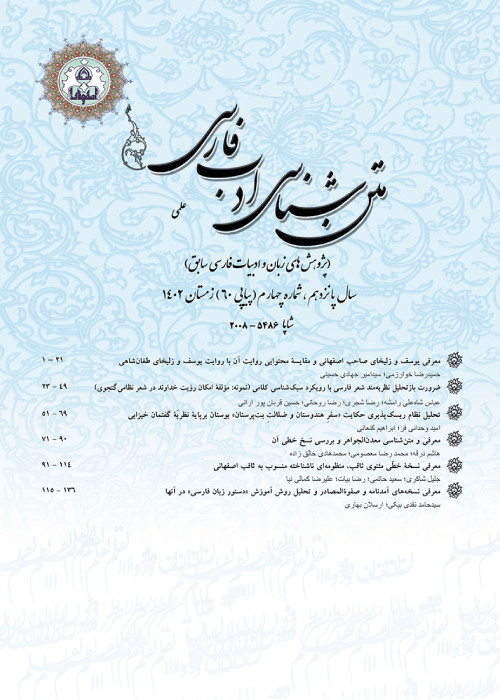Investigating the Accuracy of the Recording of the Farsi Poems of Tarikh-e Baihaqi in Two Versions of Fayyaz and Yahaghi–Seyedi
In more than a quarter of Farsi Poems of Tarikh-e Baihaqi, there are some discrepancies in the recordings of the verses in the two versions of Fayyaz and Yahaghi–Seyedi. This has caused a significant difference. The present study sought to determine the correct recordings of these verses by analyzing the differences. Tarikh-e Baihaqi is an important work from both historical and literal aspects. This study aimed to validate these two recordings of the verses and to provide a better recording of them. It also intended to create a better understanding of the concepts of Tarikh-e Baihaqi. In order to give more weight to historical elements, Baihaqi used a variety of sources including Persian and Arabic verses, the Holy Quran, hadiths (Prophet Mohammad’s narrated words), proverbs, quotations, and other similar elements. He used a total of 321 lines (verses) of Persian poetry. The aim of the research was to compare the meaning of Persian poems in Tarikh-e Baihaqi in two versions of this book (Fayyaz and Yahaghi–Seyedi) and to find out which of these two versions is better and has more value and validity in terms of meaning.
In the present study, first, the recordings of these 321 poetic lines in the two versions have been examined comparatively and the differences between these two versions in the recordings of Persian poems have been shown. Then, the cases in which the meaning of a verse or a line is not in harmony with the meaning of the same verse or line in the other versions were identified. The research method of this study was descriptive-analytical. The data were analyzed in a completely inductive way using library and indexing methods. Due attention was paid to vocabulary alignment and selection and their placement in co-occurrence and succession. Also, in analyzing differences in the versions in a discursive-rational way due attention was paid to grammar, semantics, and poetical meters. Among the six published versions of Tarikh-e Baihaqi, the present study has compared the two versions of Fayyaz and Yahaghi–Seyedi for reasons of the accuracy of opinion and obtaining more manuscripts in the field of Persian poetry.
Through a comprehensive study of the Persian poems of Tarikh-e Baihaqi, the authors of the present study found that, for various reasons, some of the verses or stanzas of this work have no clear meaning or no meaning at all. The four long kasidas (odes) of Skafi with 249 lines make up more than 77 percent of the Persian poems in this book. All four odes are about the historical events mentioned in Tarikh-e Baihaqi. Therefore, they are very consistent both horizontally and vertically. Paying attention to this important point in correcting the poems of Tarikh-e Baihaqi is one of the means to achieve a definite corrected version. This research has tried to provide the correct meaning of these lines and, consequently the correct form of these verses following rules of syntax and writing, applying aesthetic criteria, consulting dictionaries of ancient vocabulary, and using reliable emended versions of the poems. The version of Tarikh-e Baihaqi published by Fayyaz came out in 1350 AH and that of Yahaghi-Seyedi was published in 1388 AH. Fayyaz used 12 versions, and Yahaghi and Seyedi used 24 versions to correct the text. Of these 24 versions, two manuscripts, C and N, are the oldest ones, which were both available for Fayyaz. Thus, although Yaghaqi and Seyedi had a significant advantage in the collection of manuscripts in terms of quantity, the manuscripts used in terms of antiquity have no advantage over the manuscripts used by Fayyaz.The results showed that in 81 verses (more than one-fourth) of the 321 verses of Persian verses in Tarikh-e Baihaqi, there are differences in the recording and reporting of the verses in these two corrections. This has created a significant difference. The results indicated that out of 321 Persian poems in Tarikh-e Baihaqi, 240 lines in both versions had no discrepancies and problems. However, there were significant differences in 81 lines. The results also showed that in 53 verses (65.43 percent), Fayyaz recorded and reported sounds better; but in 14 verses (17.28 percent), the Yahaghi-Seyedi’s recording seemed to be better. Furthermore, the correct and clear meaning of 4 verses out of 14 verses which were meaningless in both versions of the book has been presented.The result suggested that Fayyaz’s correction is by far better than the correction of Yahaghi-Seyedi. This is despite the fact that nearly 50 years have passed since its publication and Fayyaz had fewer manuscripts and had no access to present-day advanced electronic search engines. Out of 81 controversial lines, 53 corrected lines by Fayyaz were superior and more valid. Of course, this finding does not mean to disqualify the value of the emended version of Yahaghi-Seyedi, because in correcting the other 14 lines, the scales are in favor of this version. The current recording of these 14 lines contained flaws that the editors themselves and other researchers have pointed out to be misleading and dubious. The authors of the article, considering the total number of the versions of both published texts, have provided suggestions for correcting 4 lines. But, 10 lines are still recorded in such a way that they do not lead to the desired meaning. This shows that other corrections of Tarikh-e Baihaqi are likely to become available.
- حق عضویت دریافتی صرف حمایت از نشریات عضو و نگهداری، تکمیل و توسعه مگیران میشود.
- پرداخت حق اشتراک و دانلود مقالات اجازه بازنشر آن در سایر رسانههای چاپی و دیجیتال را به کاربر نمیدهد.



